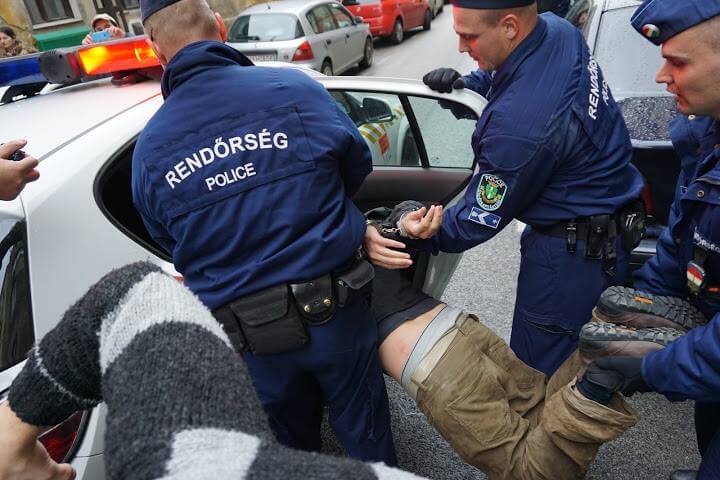Jakub Dymek: You’re a very active member of what might be called the “informal opposition” in Hungary. Your name popped up a number of times when I was researching the political situation in the country. But what is it exactly that do you do?
Bálint Misetics: Professionally I’m what you call in Hungarian a szociálpolitikus – someone who analyzes and designs social policies. My focus is poverty and homelessness, housing policy, and the politics of the development of the welfare state. I am also a member of A Város Mindenkié which translates into The City is for All; an activist group in which homeless people and others living in housing poverty work together for housing rights and social justice along with non-homeless activists whom we call “allies”, such as myself. Since 2010, I have also been taking part in organizing various protests and civil disobedience actions for pro-democracy causes or for the desegregation of the public school system. For example, we organized a campaign and a non-violent “occupation” of the governing party’s headquarters against the fourth amendment of the “Fundamental Law”, which presented a serious infringement on several fundamental rights and essentially abolished constitutional democracy in Hungary.
Bálint Misetics
is an activist and regular contributor to Kettős Mérce, a left-wing website devoted to Hungarian and international politics, with a special focus on issues related to equality, solidarity, social rights and disenfranchised people.Why poverty then? Why do something so unspectacular, like social work in underprivileged parts of Budapest, when, as you say, the constitution is being shredded and fundamental rights disposed of?
We, and I also mean those people who were already in the “opposition” before Orbán came into power in 2010, who are critical of the kind of liberal democracy that was established here, in Hungary, have found ourselves defending the same liberal democratic standards out of necessity. And we do that – defend the liberal minimum. But still, one must avoid a prevalent bias in thinking about political systems. What are our criteria in assessing the level of oppression of these systems? Do we only take into consideration civil rights, the constitutional court, the independence of the media, and state institutions? Well, this regime, the Hungarian regime, is oppressive not only because of its infringement on the independence of the constitutional court, but also because it keeps millions of people in extreme poverty, either intentionally, or with policies that cannot have any outcome other than an increase of poverty and social inequalities. Pushing people into poverty or keeping them poor is a form of oppression.
If we want to analyze Hungary’s political system, we have to look not only at the changes to the electoral law and the constitutional court, but also the changes in social policies that affect the livelihoods of the people.
This bias that I’m speaking of is also present in the international press coverage and political responses to the Hungarian situation. For example, if the government forces judges into compulsory retirement, which is – rightly – considered a threat to the independence of the judicial system, that gets a lot of attention. But when they cut back social welfare payments for the long-term unemployed to unprecedentedly low levels and introduce punitive workfare conditions, that doesn’t really seem to concern anyone outside of Hungary. Cutting the safety net for the poor is not considered a fundamental threat to democracy, but it is. Poverty has been an increasingly deepening problem in this country since the transition to free market capitalism, but poverty was never as widespread, nor as deep, as it became after a few years of this government’s rule. The same can be said of income inequality. During the past few years, Hungary registered the largest increase in the Gini coefficient among all the EU member states. So, if we want to analyze Hungary’s political system, we have to look not only at the changes to the electoral law and the constitutional court, but also the changes in social policies that affect the livelihoods of the people.
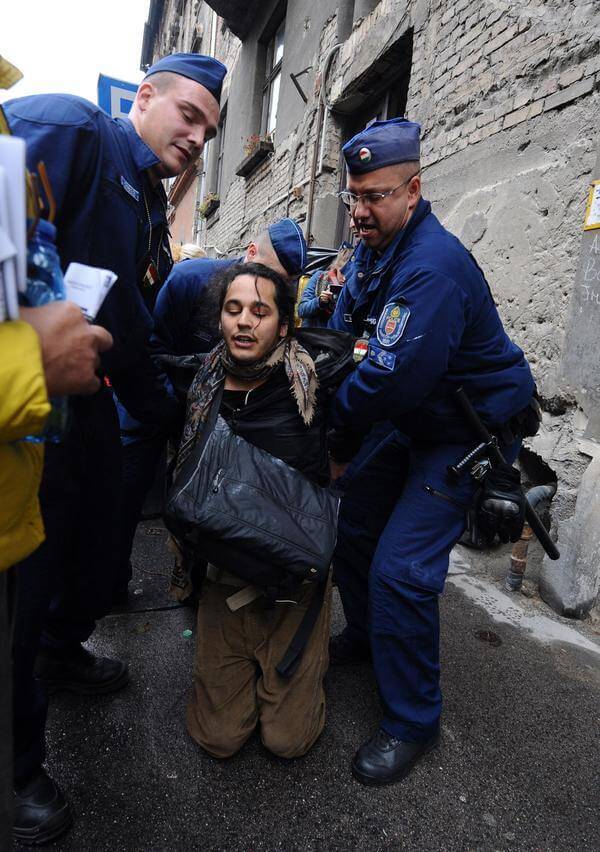
It could be argued that Viktor Orbán’s social policies aren’t inventions of his own, but stem from the austerity agenda that has dominated Europe during the years of the economic crisis. If it hadn’t been for this agenda, and the accompanying cuts, the economic situation in Hungary would be much worse than it is now.
This is a matter of economics. From a Keynsian point of view, the welfare state is a stabilizing instrument, an automatic anti-cyclical device when there’s not enough purchasing power in the market. So I already disagree with the theoretical premise that undermining the welfare state helped the country economically during the years of the crisis. But it is also necessary to add that the Hungarian government is even to the right of the International Monetary Fund, which had criticised Hungary for introducing a flat tax a few years back. Furthermore, even researchers at the IMF or at the OECD have been increasingly vocal about how social inequalities (and not egalitarian social policies) are detrimental to economic development, all to no avail. The EU has indeed played – directly or indirectly – a negative role in pushing its austerity agenda, but I believe this was just a pretext for the Hungarian government. In spite of having significant leeway, the cuts went far beyond what was necessary and contributed to the destruction of the welfare state.
The main reason for welfare cuts is not financial austerity but a punitive anti-welfare state ideological agenda.
But even if someone is deeply committed to budgetary discipline, one can achieve it in a number of ways with different distributional consequences. What this government has systematically done is implement reforms that increased inequalities as well as the exploitation and dependence of workers. Take the new labour code as an example: it guarantees only three months of unemployment benefits – which is the shortest period in Europe. And it’s just one example of many.
The broader problem however is the punitive approach that this government takes towards literally every part of social life – from school attendance and homelessness to the treatment of asylum seekers and substance abusers. The government’s response to anything that is perceived as a social problem is to use measures of coercion or punishment. The main reason for welfare cuts is not financial austerity but a punitive anti-welfare state ideological agenda. Let’s look at the housing allowance, which was a widespread subsidy until 1 March 2015, before the government decided to cut it. The burden to the state’s budget was minimal, meaning the government might have easily found the money elsewhere. From the point of view of the recipients of this housing allowance, these sums, although quite low, were of enormous importance to them. It was much needed help for survival. The decision to cut the allowance could not be justified from the standpoint of fiscal discipline. The housing allowance system alone couldn’t possibly create problems for the budget or generate a deficit. What it really means is that the intention is different. It was never about the budget in the first place. These cuts are used as disciplinary measures against the poorest.
What about the taxes imposed on banks and big retailers – measures that presented Viktor Orbán’s attitude towards the economy as more statist and protective of national business and trade?
I believe some of these measures might have been legitimate responses, even if not in their actual forms. However, this leads to some misunderstanding, because, as you’ve said, the system is presented at times as more “statist”. Even the liberal opposition against Orbán here in Hungary sometimes accuses Orbán of being “communist”, “statist” or “Kádárist” – referring to the long- standing leader of the pre-1990 system, János Kádár. This is misleading, because as far as the welfare state is concerned, and contrary to its attraction to centralization, this is an extremely pro-market regime. It is best characterised by the metaphor that Loïc Wacquant used to describe the neoliberal state in general, calling it the “Centaur State”, which, presents itself as radically different at the two ends of the social hierarchy. Like a mythological Centaur, it has a gruesome animal body with the hooves threatening the lower classes, labour rights or welfare protection. But in striking contrast to this paternalistic, puntive approach, it has a human face above, and provides generous support to the wealthier. This division is well represented in Hungary. Since 2010, the share of national income divided between deciles of the population is obviously more and more skewed towards the wealthier and this inequality has increased quite significantly. The only decile of the population that has significantly benefited is the top one, with the layer below them in second place.. Everybody lost out but the richest! And the lower you go on the ladder of income distribution, the more people lose out. That’s what’s going on with tax policy, family policy or housing policy. These changes in income and wealth distribution have many more important consequences when it comes to the overall shape of the emerging socio-economic system, than some taxes aimed at specific sectors of society.
Putting theory aside for a moment, what is the effect of the socio-economic policies of Orbán’s government on Hungarian society?
It is important to note that even if the current attack on the welfare state is unprecedented, the anti-poor policy shift began before 2010. It was at the end of “socialist” Prime Minister Ferenc Gyurcsány’s second term, when significant cut-backs in welfare payments and the introduction of strict conditions started, including the extension of a punitive workfare program. This was organized by local authorities, with compulsory participation. It is a hotbed of personal dependency, arbitrariness, and humiliating working conditions, and has been repeatedly demonstrated to be completely ineffective (or even counter-productive) in putting jobless citizens back into the primary labour market.
It is not only constitutional democracy, but also the welfare state that needs to be rebuilt in Hungary.
It was also then – around 2008 – when the government abandoned its program for ethnic desegregation in the public school system. This is extremely important, because schooling is the main mechanism of reproducing not only the strikingly low employment rate, but also of leveling social and class inequalities. The link between a student’s socio-economic status and that of his or her parents to his or her education levels is the second strongest among the OECD countries.
What I’m saying is that simply returning to the previous system wouldn’t do justice to those members of society who face the burden of austerity politics implemented by both the previous and current governments. Going back to the pre-2010 system might offer some relief to those who feel their freedoms were infringed by the government’s treatment of the courts and media, but such a reversal wouldn’t help the lower classes very much. It is not only constitutional democracy, but also the welfare state that needs to be rebuilt in Hungary. There’s been a significant shift in social policy and that ties with the workfare approach.
Why?
Workfare programmes became almost synonymous with the welfare state in Hungary, or at any rate its symbol, if you can still call it a welfare state. Prime Minister Viktor Orbán explicitly argued against the idea of the “welfare state” which he juxtaposes with the idea of the “workfare state”. There’s no other country in Europe that invests so much in these programmes or includes as many people as it does here. These programs are quite popular thanks to their simplicity. “People don’t have a job, so let’s give them something to do”, goes the argument. The effects of this are quite ambivalent – workfare programs indeed raised the income of the poorest to some extent, but on the other hand, they also keep them in a vicious circle of prolonged unemployment. It goes like this: the unemployed receive low cash payments for being employed in workfare programmes for a few months for wages below the otherwise statutory minimum wage, and then becoming unemployed again. These programmes create a “feudal” dependency of the workers on local authorities – you’re not only totally dependent on workfare, because it is tied to your eligibility for cash payments (which are taken away from you if you don’t work long enough), but also because if you’re fired, you’re punished by losing your eligibility for state aid for three years. And it is often the mayor who personally decides who gets to participate and who doesn’t. It’s politically demobilising and weakening to those in society who already are in a subordinate position.
Of course, the workfare approach extends beyond compulsory work programmes. Changes to the labour code and the cutting of other cash payments are rooted in similar logic.
What you are arguing is that government is deliberately trying to create a subjugated underclass of low-cost workers dependent on state aid, while simultaneously opening opportunities for the middle and upper class?
I think this is close to the full picture of what’s going on, although the middle class isn’t usually a direct beneficiary of that system. Let’s take the policy of “rezsicsökkentés”, which means something like “decreasing housing costs” in English. It is an administrative decrease in the costs of household energy (gas, electricity, water). This seems to have been a success politically and the government wants this to be seen as something that benefits everyone.
And does it?
Obviously not. First of all, there are around half a million households that don’t use gas for heating, usually in the lowest segments of the society, who use wood. Second (and this has been a criticism of the distributive effects of all-round consumption subsidies in Hungary already in the 1970s!), the more you consume, the more you benefit. If you have a big, centrally heated house, you’ll benefit more from cheaper household energy than somebody renting a one-bedroom apartment. And there are 1.3 million people (around 13% of the population) who are unable to afford proper heating of their homes at all.
Meaning that policies such as this one, aimed at “helping all”, didn’t decrease inequality?
Compare the neighboring Central-Eastern European countries that have a similar per capita GDP as Hungary. Taking into account the social indicators of the level of poverty, lack of housing and marginaliztion, you will see that Hungary has the worst, and an increasingly worsening record. If you look at Poland, Slovakia, Slovenia or the Czech Republic, the social situation in Hungary is significantly worse. And this is mostly due to the anti-egalitarian, anti-welfare state politics of this government.
However, it doesn’t look like the government’s approval ratings are going down because of this.
Well, I’m not an expert on polls, but the Fidesz government gained its second two-thirds parliamentary majority with fewer votes than the number of votes they received in the 2006 elections, which they lost. You cannot erase the fact that they’ve significantly changed the electoral system to their benefit. And I’m not talking about some gerrymandering here and there. It’s a wholesale reconstruction of the way the elections work in this country, in order to secure their own victory and two-third majority in parliament (which by the way they lost in a by-election defeat last February).
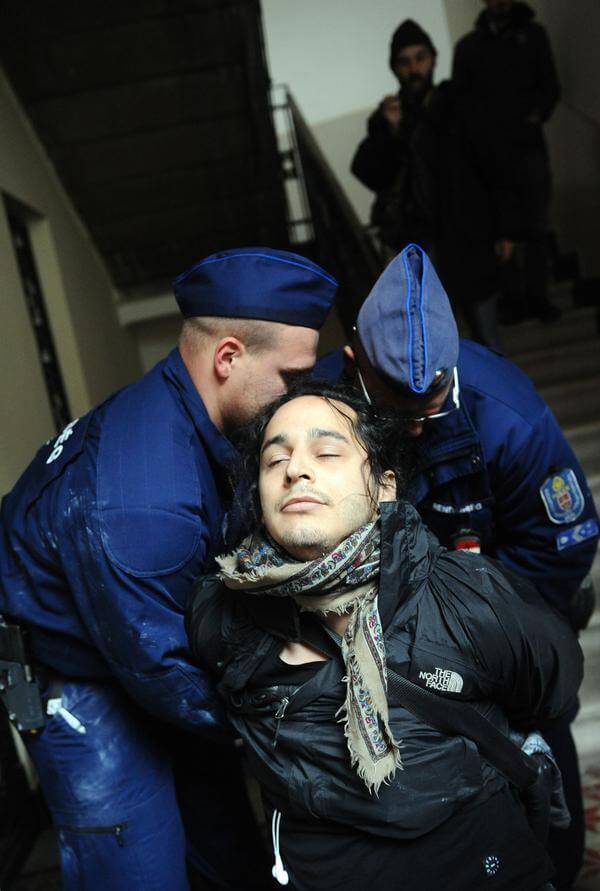
What about other political forces?
There’s a lot of confusion in society and anger towards the government, but these emotions aren’t finding a proper political channel for articulation. One reason for this is, for example, the ease of travelling and moving abroad. If you think of what Albert Hirschmann wrote in his classic 1970 essay about the possible responses to a deteriorating situation: loyalty, voice, or exit, you see how easy the exit option is now. Which wasn’t, of course, that easy in the authoritarian regimes of the past. So when exit is so easy, you have less of an incentive to raise your voice and that applies to Hungary today very well. Also the opposition lacks a visible party, movement or political alternative to Orbán. There’s of course the fascist Jobbik on the Right, which is currently the second most popular party in Hungary, but what I mean is the opposition from the Left. There’s no force to address the inequalities in an understandable and credible way.
There is also a certain acclimatisation to the ideology of the current regime of nominally “Left” parties. For example, one of the former heads of the Socialist Party, who served in numerous government positions in the past, spoke in defence of building a fence between Hungary and Serbia and the militarisation of the border by the Orbán cabinet. Ferenc Gyurcsány, former PM and now leader of one of the opposition parties on the liberal side, perhaps the most visible one, claimed that he wouldn’t reverse the decision to implement a flat tax, because that would be politically unpopular. The Socialist Party argued for the reintroduction of progressive taxation without, however, increasing the taxation of higher income groups, but keeping the current flat rate of 16% as the highest rate.
It’s possible, too, that Hungarian society is so passive that even if there would be a genuinely left-wing, visible and credible force, be it a movement or a party, it wouldn’t get much support. But that variant hasn’t been tried in the past. So as long as we haven’t tried this yet, I’d give Hungarian society the benefit of the doubt. But the larger parties led by the pre-2010 political elites don’t fit any of these criteria: they are only nominally left-wing, they are not authentic, and therefore they are not credible. Other than those, there are community organizations and activists groups, but it’s heavy-duty work and it’s not that easy to get involved in one of those. Facebook groups on the other hand, which have often been at the centre of public discourse about the Hungarian opposition movements in the past years, are easy to engage with, but honestly, they cannot be called a movement at all. And as for most of the NGOs, they don’t provide any feasible form of involvement for anybody outside the small circle of activists, even if they are involved politically, since most of these have a narrow focus on direct service provision.
You say that there aren’t any serious means of engagement, but I’ve seen pictures of yourself being dragged by the police on the streets of Budapest. Were there civil disobedience actions in the past?
Yes, we as activists have resorted to civil disobedience and non-violent protests several times. I believe there were some successful examples. One of the best known actions we did was the aforementioned symbolic occupation of theFidesz headquarters when they introduced changes to the Fundamental Law in the spring of 2013. The occupation didn’t stop the changes to the law, but it was successful in bringing the issue of the changes to the forefront of public debate and in mobilising more people to participate in other kinds of protest. Thanks to the occupation, a lot of people went out into the streets to protest against the Fidesz government who otherwise wouldn’t have.
Evicting somebody into the street because of poverty is violence, but it isn’t usually perceived as such, unless there is a group of activists there who need to be forcefully dragged away.
More direct results were obtained when last autumn, activists of A Város Mindenkié protested against an eviction in the 8th district of Budapest. We formed a “living chain” of people in an attempt to stop the eviction from happening. That led to some pretty dramatic scenes with the police. The living chain didn’t stop that eviction from happening, but it mobilised support for the evicted family who eventually found substitute housing. And it most probably played a major role in the the mayor’s decision (announced just a week after our civil disobedience) to temporarily ban all evictions from taking place in the district’s public housing system and to reevalute the local authority’s related policies. And he’s a prominent, nationally recognised politician of Fidesz (most probably their nominee for Budapest’s next mayor), who gained fame for his punitive approach towards homeless people and has been the fiercest advocate of the criminalization of homelessness.
Civil disobedience actions are important, because they can make social injustices – and the violence inherent in them – visible. Evicting somebody into the street because of poverty is violence, but it isn’t usually perceived as such, unless there is a group of activists there who need to be forcefully dragged away, hand-cuffed and arrested by the police for the eviction to proceed.
What’s the reaction of the state, society, and media to that?
I’ll get to that. What’s the most visible sign of the oppressiveness of any regime? Police violence. So you’d see pictures of protesters being beaten in the streets, people going to jail and all that. One of the quirks of the Hungarian situation is that while the Hungarian state has become increasingly undemocratic in almost all aspects – media, elections, the constitution, welfare provision, the list goes on – law enforcement by the police as far as the opposition or protesters are concerned is the most visible exception to that rule. Part of the legitimacy of today’s government comes from the sometimes brutal police violence against the participants of the 2006 anti-government protests. Fidesz is very well aware of that, so they’re careful in how they handle protests. You can even argue that the police response to protests is sometimes more liberal now than it was before Fidesz came to power. What the government does instead is to defame prominent members of protest groups and activists.
How does it work exactly ? When we organised protests outside the Fidesz headquarters with 80 or 100 people, we were portrayed in the state and pro-government media as violent troublemakers who smashed the windows of the headquarters. I was even portrayed as being the main Budapest organizer for Gordon Bajnai, the former Socialist Party Prime Minister – which was completely false. During the next big wave of protests, against the internet tax, the media “uncovered” various offenses of the most visible faces (organizers, speakers) of the protests: a traffic accident here, a fraction of a gram of weed in someone’s bag there. There was a teacher who spoke at a rally, so the media went to the school where she works, asking about an alleged tax fraud she committed – which also turned out to be false. (They also went to the wrong school, looking for the wrong teacher because some other teacher had the same name as the one who spoke at the rally). In spite of this, it still was the lead story in the news for days. This, after all, sends the message: if you do something which seems to threaten even a small part of government policy, be prepared for a frontal campaign of defamation, because we will find something on you, and even if we don’t, we’ll invent something.
There is another technique. We, as the organisers of protests against Fidesz, were accused of violent acts. The exact crime the police started investigating if committed collectively, is punishable by up to three years in prison. The case did not even reach the courts, because the prosecution already found it to be unsubstantiated. But while that didn’t make the news, the pro-government and state media extensively reported the accusations. So the government does not need to imprison or use trials against opposition activists. The media do the job of deterrence and intimidation for them quite well.
And again, this is also a social justice issue. You’re especially in danger when employed by the state, in the public sector. This could make you afraid of even being seen at a public protest. Unemployment and income insecurity is widespread in Hungary, so many feel that they cannot afford risking their livelihood at all. According to Eurostat data, around 75% of Hungarians, an exceptionally high number, respond that they couldn’t cope with any unexpected financial expenses.
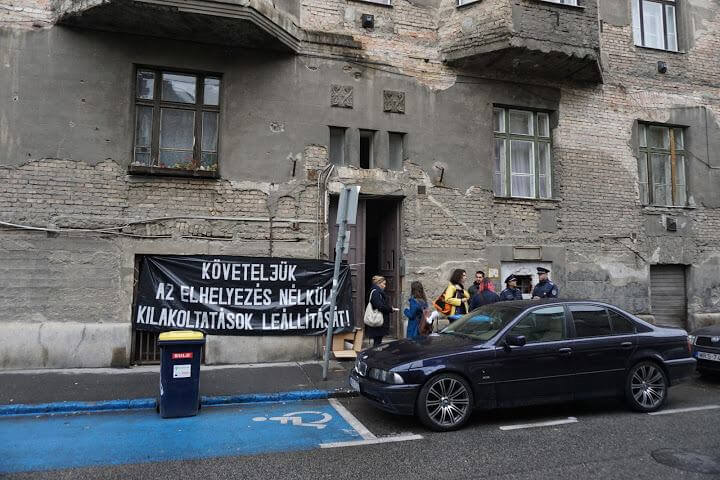
But people still vote for Fidesz?
Some of them do.
Most of them.
[laughs] Yes, though Fidesz’s parliamentary majority is not caused by, and does not translate into a similar popularity in the overall electorate. Again, and I don’t want to repeat
myself, but the situation would also be different if there was a credible alternative. There are serious obstacles to undermining Fidesz’ lead over other political forces – one should not underestimate the effect of the media and an electoral system skewed towards Fidesz in particular, and towards large parties in general. There’s one big party on the Right (the other governing party, the “Christian-Democratic” KDNP exists mainly in its name) and a fragmented opposition on the liberal and Left side. Those parties, instead of promoting their political views, found themselves spending much of their time and energy during the election campaign over embittered negotiations between themselves.
Is there a chance for consolidation in some reasonable timeframe? Or are there any other options the opposition could consider?
It’s not an easy thing to do. Fidesz has changed the electoral system just enough to get a desired outcome, but not enough to make it look like obvious electoral fraud. Parties of the “establishment Left” tried to adapt to this new system, which led to a monumental defeat in the 2014 elections. This strategy might also just have been wrong from the start, because if the opposition had been more popular, what would have stopped the government from adjusting the electoral system a little bit further to their advantage?
It would be advisable – morally, but on a superficial level, also strategically – for the liberal opposition to work together as a bloc in order to defend or restore the basic standards of constitutional democracy or parliamentary representation. But this does not seem to work. And this is the dilemma that is well recognised by newly emerging political forces, for example by Lehet Más a Politika (Another Politics is Possible) here in Hungary, and maybe also by Razem in Poland. Either you make yourself appear as somebody who defends democracy as it was and doesn’t mind going back to the pre-2010 system, meaning you don’t mind working with liberal and establishment parties. Or you don’t want to go back to the previous system, you have more ambitious political goals, and you identify yourself in opposition not only to the current government, but to the more broadly understood political ruling class. In the second case, it is very easy to lose your authenticity and in the case of a newly emerging, and therefore smaller party, even your difference or visibility. You also risk being marginalised in a majority electoral system and being – partially rightly – accused of helping to keep the Right in power. These are all bad options to choose from. But what else is there to do?
First, you don’t have to focus on winning the elections, but pressuring the government for a more equitable electoral system, which in turn would open and democratise the system. In such a situation it wouldn’t be necessary to participate immediately as a smaller, weaker party in a larger coalition in an attempt to win the elections. Beyond elections, what I see as a reasonable move is starting to build a larger, more inclusive and, what is most important, sustained, long-term, leftist democratic movement. One that is not single-issue and which will not focus on electoral results in the beginning. Because, honestly, defeating this government is not a realistic option in the short run – especially for a new, genuinely leftist project. Up until now, reactive strategies like civil disobedience or protests were somehow successful in engaging people and bringing topics to the forefront of political debate. But there was no long-standing political project behind them. So, obviously, such actions should continue but the challenge for the organisers and activists is to help them contribute to a more over-arching political project, something that will last.
Why is this important? Look at the democratic opposition of the so-called “socialist” regime before 1990: small groups of intellectuals, doing samizdat, illegal social work and charity drives, organising smaller protests. It was not them, who defeated the system. This might be unfortunate, but it is quite obvious. It was heroic what they were doing, but it wasn’t their activism that made the system collapse. But it was very important, nonetheless, that when the system collapsed, mostly independent of what the opposition was doing, that they were there. Because those groups – small scale and rather irrelevant to the system as a whole – were in the position of influencing the institutional framework, the political culture, and the formative policy decisions of the new system. So I think that we need to focus on the kind of political work which might lead to the emergence of a substantial counter-weight against the current regime, but even if it doesn’t, it will put us in a better position for fighting for egalitarian social changes once there is a new democratic opening. For example, we must at least ensure, that when this regime falls at some point, it will be obvious to everybody that what was wrong with it. It wasn’t only its violation of the principle of separation of powers, or its obscene, systemic corruption, but also that it held millions of people in dependency, income insecurity and poverty. That extreme social inequality is also matter of oppression, and that social rights (and not only civil and political rights) are matters of freedom and democracy. We must, at the very least, make sure, that after a change of regime, we will not return to that unjust neo-capitalist swampland which made the emergence of the current anti-democratic regime possible in the first place.
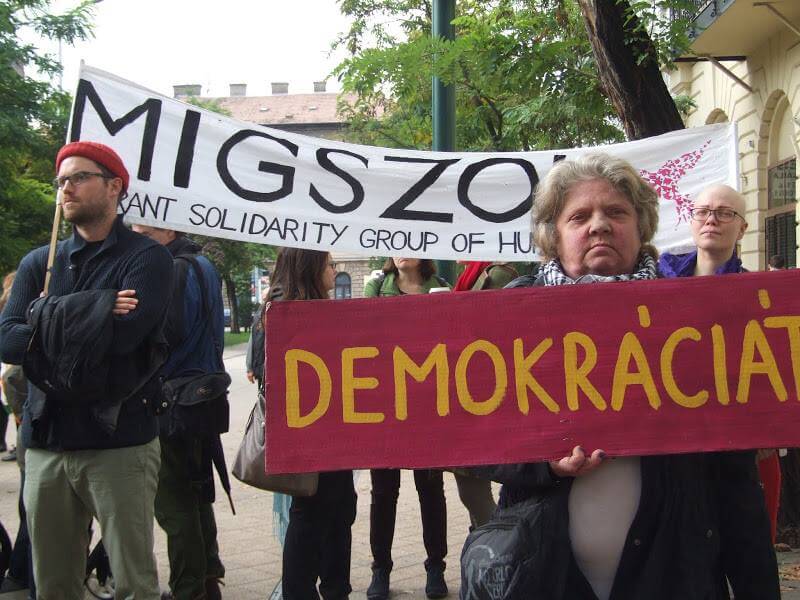
![Political Critique [DISCONTINUED]](http://politicalcritique.org/wp-content/uploads/2015/09/Political-Critique-LOGO.png)
![Political Critique [DISCONTINUED]](http://politicalcritique.org/wp-content/uploads/2015/09/Political-Critique-LOGO-2.png)
